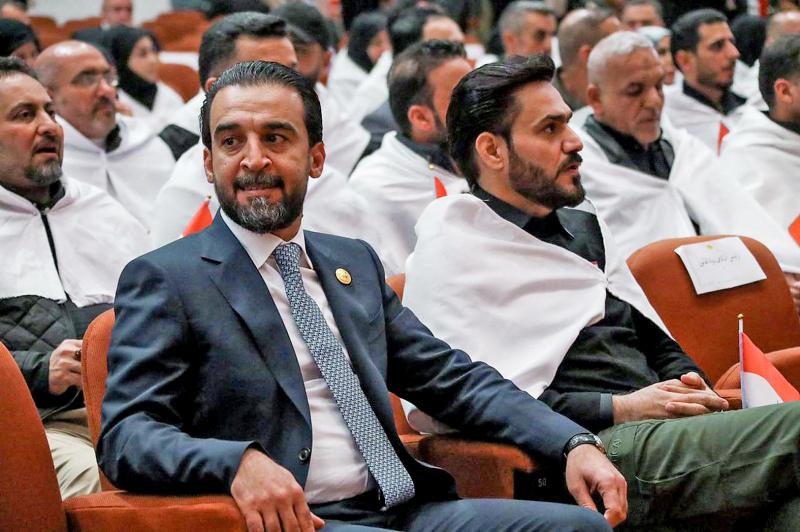The new Iraqi Council of Representatives on Sunday opened with a heated inaugural session, three tense months after legislative elections won by Shiite cleric Moqtada al-Sadr, the likely kingmaker of the next government.
Al-Sadr, 47, who once led an anti-US militia and who has a large following, is expected to have the key say in who is to serve as the next prime minister, a post held by Mustafa al-Kadhemi.
Sunday saw the swearing in of the 329 members of the unicameral parliament and the re-election of Iraqi Representative Mohammed al-Halbousi, who is Sunni, as speaker.

Photo: Reuters
However, a dispute broke out between lawmakers of the Shiite Coordination Framework coalition and their rivals under al-Sadr, several parliamentary sources said.
Iraq’s post-election period has been marred by high tensions, violence and allegations of voter fraud.
Iraqi Representative Mahmud al-Mashhadani, the oldest member of parliament who chaired Sunday’s session, was “hospitalized,” public television said.
Iraqi News Agency reported that he was in a “stable” condition, while a parliamentary source requesting anonymity said that al-Mashhadani “fainted.”
Videos filmed by lawmakers showed them fighting among themselves and the session was suspended for more than an hour before resuming.
Al-Sadr, who wears the black turban of a descendant of Islam’s Prophet Mohammed, emerged as the big winner of the polls on Oct. 10 last year.
The elections had been held several months early as a concession to a democracy movement.
Al-Sadr’s movement, which ran after he reversed an initial election boycott call, won 73 of the 329 seats.
Iraqi Representative Muthana Amin, who is Kurdish, said that Sunday’s session “began normally,” but that the Coordination Framework claimed it was the largest alliance in parliament, with 88 seats.
Mashhadani “asked for the information to be verified, after which he was abused,” Amin told reporters, without saying whether his hospitalization was linked to the incident.
Within 30 days of its inaugural session, the parliament must elect the president of the republic.
The new president must then appoint a premier, who is chosen by the largest coalition and has 30 days to form a government.
Some experts expect a new governing team in place by March for the oil-rich, but war-battered country of 40 million people.
Al-Sadr has repeatedly said that he wants to break with the Iraqi political tradition of a “consensus” government to instead build a majority government.
That would mean securing a ruling majority that would appoint a premier and a Cabinet from within its ranks.

South Korea would soon no longer be one of the few countries where Google Maps does not work properly, after its security-conscious government reversed a two-decade stance to approve the export of high-precision map data to overseas servers. The approval was made “on the condition that strict security requirements are met,” the South Korean Ministry of Land, Infrastructure and Transport said. Those conditions include blurring military and other sensitive security-related facilities, as well as restricting longitude and latitude coordinates for South Korean territory on products such as Google Maps and Google Earth, it said. The decision is expected to hurt Naver and Kakao

THE TRAGEDY OF PUNCH: Footage of the seven-month-old Japanese macaque has gone viral online after he was rejected by his mother and formed a bond with a soft toy A baby monkey in Japan has captured hearts around the world after videos of him being bullied by other monkeys and rejected by his mother went viral last week. Punch, a Japanese macaque, was born in July last year at Ichikawa City Zoo. He has drawn international attention after zookeepers gave him a stuffed orangutan toy after he was abandoned by his mother. Without maternal guidance to help him integrate, Punch has turned to the toy for comfort. He has been filmed multiple times being dragged and chased by older Japanese macaques inside the enclosure. Early clips showed him wandering alone with

MONEY GRAB: People were rushing to collect bills scattered on the ground after the plane transporting money crashed, which an official said hindered rescue efforts A cargo plane carrying money on Friday crashed near Bolivia’s capital, damaging about a dozen vehicles on highway, scattering bills on the ground and leaving at least 15 people dead and others injured, an official said. Bolivian Minister of Defense Marcelo Salinas said the Hercules C-130 plane was transporting newly printed Bolivian currency when it “landed and veered off the runway” at an airport in El Alto, a city adjacent to La Paz, before ending up in a nearby field. Firefighters managed to put out the flames that engulfed the aircraft. Fire chief Pavel Tovar said at least 15 people died, but

Australian Prime Minister Anthony Albanese yesterday said he did not take his security for granted, after he was evacuated from his residence for several hours following a bomb threat sent to a Chinese dance group. Albanese was evacuated from his Canberra residence late on Tuesday following the threat, and returned a few hours later after nothing suspicious was found. The bomb scare was among several e-mails threatening Albanese sent to a representative of Shen Yun, a classical Chinese dance troupe banned in China that is due to perform in Australia this month, a spokesperson for the group said in a statement. The e-mail